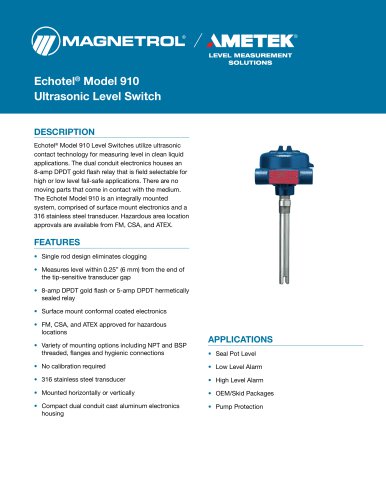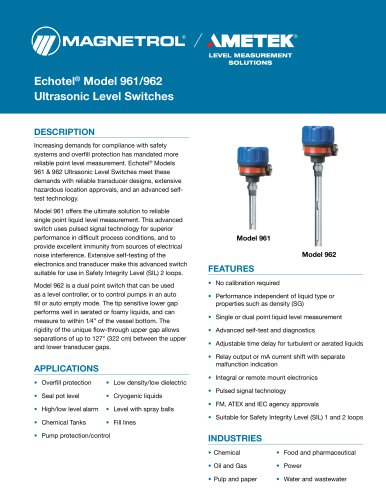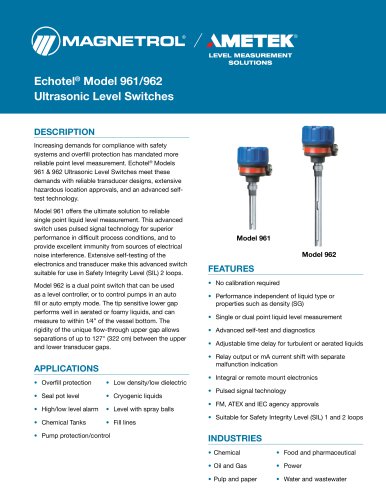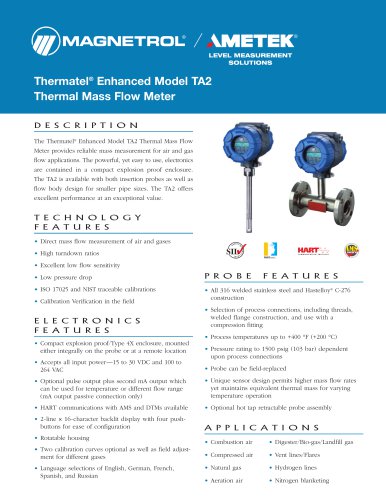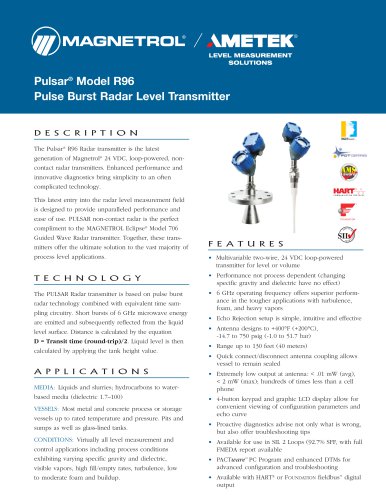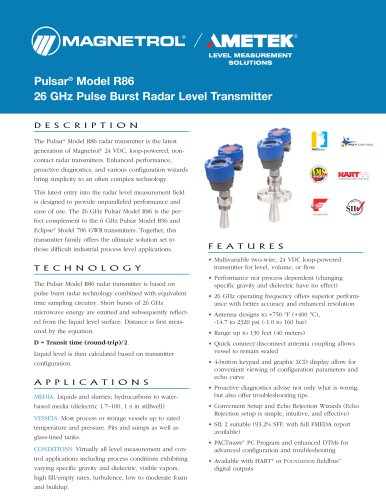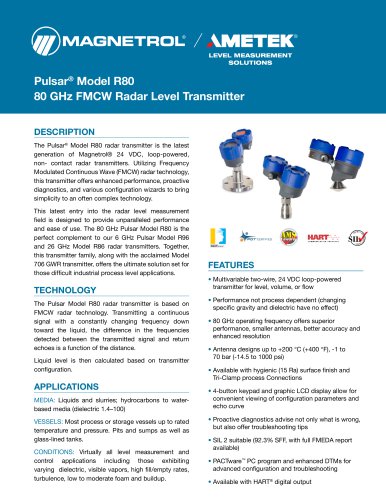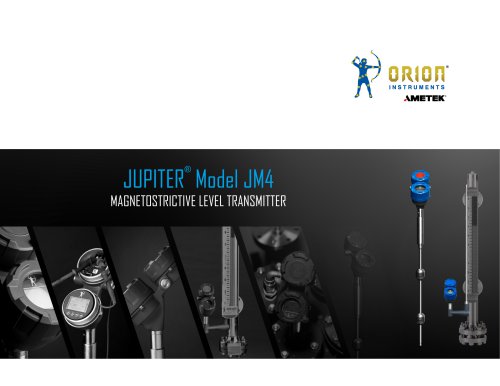 Website:
Magnetrol - AMETEK
Website:
Magnetrol - AMETEK
Group: AMETEK
Catalog excerpts
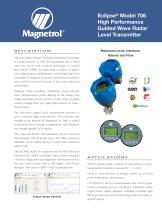
Eclipse® Model 706 High Performance Guided Wave Radar Level Transmitter DESCRIPTION Measures Level, Interface, Volume, and Flow The Eclipse® Model 706 High Performance Transmitter is a loop-powered, 24 VDC level transmitter that is based upon the proven and accepted technology of Guided Wave Radar (GWR). Encompassing a number of significant engineering accomplishments, this leading edge level transmitter is designed to provide measurement performance well beyond that of many of the more traditional technologies. Utilizing patented “diode switching” technology, along with the most comprehensive probe offering on the market, this single transmitter can be used in a wide variety of applications ranging from very light hydrocarbons to water-based media. The innovative angled, dual compartment enclosure is now a common sight in the industry. This enclosure, first brought to the industry by Magnetrol® in 1998, is angled to maximize ease of wiring, configuration, and viewing of the versatile graphic LCD display. One universal Model 706 transmitter can be used and interchanged with all probe types, and offers enhanced reliability as it is certified for use in critical SIL 2 hardware safety loops. With the use of a unique adapter, the model 706 transmitter can even operate with older Model 705 probes. The Eclipse Model 706 supports both the FDT/DTM and Enhanced DD (EDDL) standards, which allow viewing of valuable configuration and diagnostic information such as the echo curve in tools such as PACTware ™, AMS Device Manager, and various HART® Field Communicators. APPLICATIONS MEDIA: Liquids, solids, or slurries; hydrocarbons to water-based media (Dielectric Constant εr = 1.2–100) VESSELS: Most process or storage vessels up to rated probe temperature and pressure. CONDITIONS: All level measurement and control applications including process conditions exhibiting visible vapors, foam, surface agitation, bubbling or boiling, high fill/empty rates, low level and varying dielectric media or specific gravity.
Open the catalog to page 1
FEATURES • Multivariable, two-wire, 24 VDC loop-powered transmitter for level, interface, volume, or flow. • Unique adapter allows operation with Model 705 probes • Diode switching technology offers best-in-class signal strength and signal-to-noise ratio (SNR) resulting in enhanced capability in difficult low dielectric applications. • Level measurement not affected by changing media characteristics. • No need to move levels for calibration. • Overfill Capable probes allow for “true level” measurement all the way up to the process seal, without the need for special algorithms. • 4-button...
Open the catalog to page 2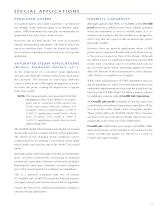
SPECIAL APPLICATIONS EMULSION LAYERS As emulsion layers, also called “rag layers,” can decrease the strength of the reflected signal in an interface application, GWR transmitters are typically recommended for applications that have clean, distinct layers. However, the Eclipse Model 706, with its powerful internal measurement algorithms, will tend to detect the top of an emulsion layer. Contact the factory for application assistance regarding emulsion layers in your specific application. SATURATED STEAM APPLICATIONS (Boilers, Feedwater Heaters, etc.) As the temperature of a saturated steam...
Open the catalog to page 3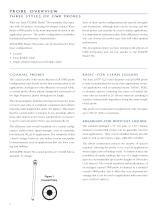
PROBE OVERVIEW TWO STYLES OF GWR PROBES With one basic Eclipse Model 706 transmitter that operates with all probes, choosing the proper Guided Wave Radar (GWR) probe is the most important decision in the application process. The probe configuration establishes fundamental performance characteristics. All Eclipse Model 706 probes can be described by two basic configurations: • Coaxial Both of these probe configurations has specific strengths and weaknesses. Although there can be overlap, and different probes can certainly be used in similar applications, it is important to understand their basic...
Open the catalog to page 4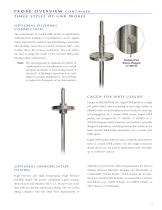
PROBE OVERVIEW CONTINUED OPTIONAL FLUSHING CONNECTION The maintenance of coaxial GWR probes in applications suffering from buildup or crystallization can be significantly improved by using an optional flushing connection. This flushing connection is a metal extension with a port welded above the process connection. The port allows the user to purge the inside of the coaxial GWR probe during routine maintenance. Note: The best approach to eliminate the effects of condensation or crystallization is to install adequate insulation or heat tracing (steam or electrical). A flushing connection is no...
Open the catalog to page 5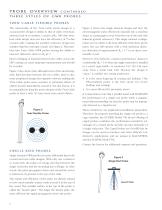
PROBE OVERVIEW CONTINUED SINGLE ROD PROBES Single element GWR probes operate quite differently from the coaxial design. With only one conductor to work with, the pulses of energy develop between the single rod probe and the mounting nut or flange. In other words, the pulse propagates down and around the rod as it references its ground at the top of the tank. The energy and efficiency of the pulse are directly related to how much metallic surface exists around it at the top of the vessel. This metallic surface at the top of the probe is called the “launch plate.” The larger the launch plate,...
Open the catalog to page 6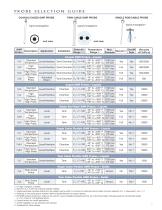
signal propagation signal propagation Launch Plate © 2nd digit A=English, C=Metric © Minimum 8r 1.2 with end of probe analysis enabled. — Single rod probes mounted directly into the vessel must be within 3-6 inches of metal tank wall to obtain minimum dielectric of 1.4, otherwise £r min = 1.7. © Depends on the probe spacer material. Refer to Model Selection for spacer options. © Eclipse probes containing o-rings can be used for vacuum (negative pressure) service, but only those probes with glass seals are hermetically sealed to <10-8 cc/sec @ 1 atmosphere helium. © When installed in...
Open the catalog to page 7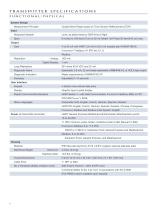
Functional Safety to SIL 2/3 in accordance with IEC 61508
Open the catalog to page 8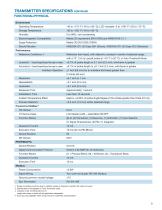
© Single rod probes must be used in metallic vessel or stillwell to maintain CE noise immunity © Specifications will degrade in Fixed Threshold mode. single rod probes in tanks will be application dependent. © Accuracy may degrade when using manual or automatic compensation.
Open the catalog to page 9All Magnetrol - AMETEK catalogs and technical brochures
-
TUFFY® II
12 Pages
-
E4 Modulevel®
12 Pages
-
Thermatel® TD1/TD2
16 Pages
-
Crude Oil Processing
8 Pages
-
Natural Gas Processing
12 Pages
-
Interface In The Field
14 Pages
-
Emulsion In The Field
9 Pages
-
PRODUCT LINE CATALOGUE
106 Pages
-
Aurora® Magnetic Level Indicator
28 Pages
-
Atlas™ Magnetic Level Indicator
24 Pages
-
STEAM DRUM LEVEL MATTERS
1 Pages
-
INTERFACE IN THE FIELD
1 Pages
-
Echotel® 355
4 Pages
-
Power Generation
16 Pages
-
Petroleum Refining
16 Pages
-
Seal Pots
4 Pages
-
Mass Flow Measurement
12 Pages
-
Heat Rate Awareness
8 Pages
-
Ethylene Applications
8 Pages
-
GEMINI™
32 Pages
-
Eclipse® Enhanced 705 Hygienic
12 Pages
-
Pneumatic Tuffy®
12 Pages
-
Models T5x & T6x
8 Pages
-
Models T20/T21
12 Pages
-
Series B73 and Series 75
12 Pages
-
Series 3
24 Pages
-
Model J52
2 Pages
-
Model B40
4 Pages
-
Floating Roof Detection
16 Pages
-
APM Pneumatic Modulevel®
12 Pages
-
Flue Gas Desulferization
8 Pages
-
Energy Management
4 Pages
-
API 2350 Overfill Prevention
8 Pages
-
PULSAR ® R96
1 Pages
-
Water & Wastewater
12 Pages
-
Displacer Switches
20 Pages
-
Displacer Transmitters
4 Pages
-
Guided Wave Radar
12 Pages
-
Magnetic Level Indicators
12 Pages
-
Thermal Dispersion
12 Pages
-
Ultrasonic Contact
4 Pages
-
R Series High Temp Switch
12 Pages
-
Series K Pneumatic Switch
8 Pages
-
J Series Pneumatic Switch
8 Pages
-
Liquid Displacer Level Switches
16 Pages
-
Crude Oil Processing
8 Pages
-
Product Line Quick Reference
8 Pages




